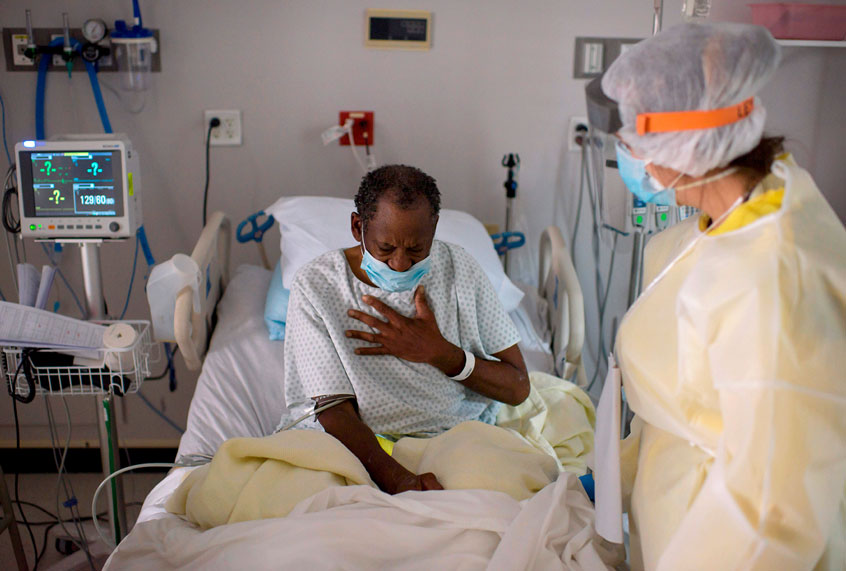A report released Thursday by the Department of Labor reveals that almost 1.2 million workers filed claims for new state unemployment benefits last week, marking the lowest total since the coronavirus pandemic struck in March. Yet these numbers came at the cost of lives and infections, which in America have ticked noticeably upward since mid-June, according to data by the Centers for Disease Control (CDC), roughly corresponding with when individual states began reopening their economies and schools at President Donald Trump’s urging.
“In the week ending August 1, the advance figure for seasonally adjusted initial claims was 1,186,000, a decrease of 249,000 from the previous week’s revised level,” the Department of Labor explained in its report. “The previous week’s level was revised up by 1,000 from 1,434,000 to 1,435,000.” The Department of Labor added that the advance seasonally adjusted insured unemployment rate was exactly 11 percent for the week ending on July 25.
Meanwhile, the coronavirus infection rate accelerated tremendously since June 1, when the 7-day average for new infections was 20,008 according to the CDC. By July 1 it had risen to 43,564; by August 1, it hit 62,519.
While the recent economic numbers offer welcome good news in terms of the economy, there is the risk that the economy will slide back into recession if premature reopenings cause the virus infection rate to remain high.
“The latest jobless numbers are fairly unsurprising and are similar to what we’ve seen in previous weeks,” Dr. Gabriel Mathy, a macroeconomist at American University, told Salon by email. “The economic crisis seems to have stabilizing but is still serious: we are seeing over a million people filing new claims every week. There is a lot of churn though, with some people finding jobs, and other losing them. Those finding new jobs is not unlikely to be related to reopenings. At this late stage in the pandemic, these layoffs are more likely to be permanent, however.”
He added, “Given that the pandemic is worsening, it seems that any tendencies for recovery are being offset with the negative effects of the second wave, and the economy seems to be stagnant currently. For the near future, the size of the new relief package will be important, as will be if the surge in new cases can be reversed.”
Dr. Richard D. Wolff, professor emeritus of economics at the University of Massachusetts Amherst, told Salon by email that the full context of the jobs report is important, noting that it “is full of rapidly changing developments that will determine whether and how any sort of sustained recovery is underway or will even take place.”
Wolff pained a picture of a job situation that is affected by events on the international stage, including “worsening US-China quarrels and/or US-EU quarrels, economic crashes in the rest of world hurting US exports, financial debt-related collapses of emerging market countries such as Argentina and their contractionary effects there impacting the US.”
Dr. Georges Benjamin, executive director of the American Public Health Association (APHA) and former secretary of health in Maryland, had a similar observation.
“I think the basic principle is the same,” Benjamin told Salon by email. “We don’t get back to work until we control the prevalence of community virus [spread]. The fastest way to reduce unemployment is to control the infection; that means controlled, strategic reopenings.”
Dr. Russell Medford, chairman of the Center for Global Health Innovation and Global Health Crisis Coordination Center, explained to Salon that there is a direct relationship between America’s ability to defeat the pandemic and its ability to experience a lasting economic recovery.
“The progress (and setbacks) we achieve in defeating the COVID-19 epidemic directly impacts the current and future economic health of the country,” Medford explained in writing. “The greater the confidence the American people and American businesses have in federal, state and local science- and evidence-based policies that recognize that COVID-19 and the economy are intertwined, the greater their confidence will be in safely resuming near-normal activities.”
There are other reasons to be concerned about the pandemic’s long-term economic effects. The influenza epidemic of 1918-1919 led to a depletion of human capital that had long-term economic consequences. Many of the Americans who have lost their jobs during this recession are likely to find themselves permanently unemployed, and Trump’s inept response to the pandemic has left America’s economic situation much worse off than those of countries with more coherent social programs like South Korea, Australia and Germany.


